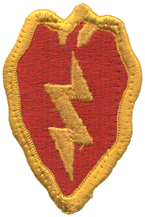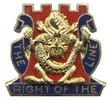America, the home of the free and the brave, of purple mountain's
majesty and fruited plains - that was all behind me now. Only a few hours ago we had
departed Anchorage. Below me lay the broad expanse of the Alaskan peninsula, studded
with range upon range of mountains. Darkness settled around the big jet, covering
the landscape below, until the images of massive rock forms firmly planted on vast plains faded into night - my last sight of America.
As we headed westward into the night, I thought of my wife in Wyoming, my family in New
Hampshire, and just how I got here in the first place. The call had come in the
summer of 1968. Unlike the Marines (who needed just a few good men), the Army needed
a good many recruits to fill its rotating ranks of one-year warriors in Vietnam. I
had returned home to New Hampshire for one last short vacation, and then reported to the
induction center in Manchester. Late that day, my army career began. A small
group of us were flown to Ft. Dix, New Jersey for nine weeks of basic training. At
the end of basic, I transferred to Ft. Polk, Louisiana, the "Home of the Combat
Infantry", for nine weeks of advanced infantry training. There we honed our
skills, learning about the weapons we'd be using in Vietnam. We practiced
patrolling, ambushing, and small-unit tactics. The drill sergeants filled us full of
first aid tips, told us how to spot the enemy and how to stay alive.
My training ended in late February. I had three weeks to say good-bye to everyone
and set my affairs in order. Then I started for Ft. Lewis, Washington, my jump-off
point for Vietnam. After a two-day wait on the West Coast, I boarded a jet for the
trans-Pacific flight.
Eighteen hours later, on April 12, 1969, I landed at Cam Ranh Bay, Republic of Vietnam.
The plane taxied to a parking area, the air-conditioning was shut off, and the
doors opened. We sat in our seats for fifteen minutes, waiting for buses.
Within one minute the hot, humid air filled the cabin. The outside temperature was
in the high nineties. Water began streaming from my forehead. In minutes the
seats were damp where we sat. My uniform clung to my skin. From winter to
summer in one day. What a change! By the time the buses arrived I suspected
what the long year ahead held in store.
We took a fifteen-minute drive across the tarmac to the main base. The low-lying
mountains circling the bay reminded me of the gently rolling hills and mountains of New
Hampshire. The sky was hazy. There was sand everywhere. Scrubby plants
grew here and there, wherever they could find a foothold.
 We left the buses and formed up on a large blacktop field, in that blazing sun.
We stood at ease for nearly half an hour, while groups of men were sent off to
their respective areas. Finally I received an assignment and was taken to a barracks
area to bunk down. Late that afternoon, I received orders to return to the airport
for a flight to Bien Hoa.
We left the buses and formed up on a large blacktop field, in that blazing sun.
We stood at ease for nearly half an hour, while groups of men were sent off to
their respective areas. Finally I received an assignment and was taken to a barracks
area to bunk down. Late that afternoon, I received orders to return to the airport
for a flight to Bien Hoa.
I boarded a waiting C-130 cargo plane through the huge open ramp at the rear. Web
seats hung from the sides with more in a double row down the center of the plane. We
packed in like sardines and the ramp closed. The huge engines roared to life.
Slowly the plane lifted from the ground and headed south and west, further into the
interior. No one told us just where we would go from Bien Hoa. But everyone
had a guess, based on the kind of Army gossip and rumor that keeps the whole organization
going. Some said we were bound for Hue, where the North Vietnamese Army had overrun
the city. Others said we would join the First Air Cavalry in central Vietnam.
Or of course we could head for the DMZ, right up along the border of North Vietnam.
 When we finally reached Bien Hoa, I learned my real
destination. I was assigned to the 25th Infantry Division, 3rd Corps, headquartered
in Cu Chi (Ho Chi Minh's hometown) about twenty-five miles north and west of Saigon.
But first there was more of that Army waiting. For twelve hours I sat on my duffel
bag, or walked around the corrugated metal building, waiting for my flight.
When we finally reached Bien Hoa, I learned my real
destination. I was assigned to the 25th Infantry Division, 3rd Corps, headquartered
in Cu Chi (Ho Chi Minh's hometown) about twenty-five miles north and west of Saigon.
But first there was more of that Army waiting. For twelve hours I sat on my duffel
bag, or walked around the corrugated metal building, waiting for my flight.
Bien Hoa brought my first exposure to potable and non-potable water. I never did figure
out just where the terms came from, but I learned not to drink the stuff that said
"non-". I'd gone to the men's room to shave off my day-and-a-half beard.
I was thirsty from the heat, and cupped my hands to take a drink. As the warm
water trickled down my throat, I saw the sign "Non-Potable Water". It was
too late to undrink it. So I sat for the rest of the afternoon wondering whether I
was going to come down with plague or something even worse. As it was, I merely
found myself making regular visits to the john for the next twenty-four hours.
All kinds of military personnel passed through Bien Hoa. Some wore neat uniforms,
with braid and medals on the lapels. Others wore grungy fatigues, carried rifles,
and hung grenades from shoulder straps. And of course there were kids. Lots of
kids. Hawking everything from soda pop to shoeshines. They'd run up, grab your
leg, and start shining your shoes. Later I learned to give them the brush-off with
"no money, no chop-chop, no cigarettes".
Finally, after another C-130 flight, I arrived at Cu Chi and was taken to my new unit,
the 2nd Battalion, 14th Infantry.
I joined Alpha Company, one of four line companies in the 2/14 Infantry. But before
going out into the field, there was more training. Just to
be sure we would have every possible chance to survive, we went through another week of
orientation. Our teachers were veterans nearing the end of their tours. They
tried to teach us what they had learned in combat.
In the evenings we were usually free to write letters or wander around the area.
Once or twice we pulled guard duty on the Cu Chi perimeter. To us newcomers, this
was the real thing. We were issued M-16 rifles and a couple magazines of ammo.
Sitting there in the dark, with the thought of thousands of lives resting in my
hands, I peered out into the night straining for any sign of movement. The slightest
sound was enough to bring every nerve to a tingling alertness. Of course we couldn't
have been safer back home. Cu Chi had been attacked only once, a year before. The
danger, the adventure, was all in my imagination.
Here at Cu Chi, I realized the last of the waiting was over. I had been hearing
about Vietnam since junior high. In high school, I wrote a term paper about the
history of the conflict. When I got to college, groups of students were already
protesting our nation's involvement. In theaters, I watched John Wayne take on the
Vietcong and win. Now it was my turn. I was actually here and going into
combat. My mind was filled with questions. What would I experience? How
would I do? I guess it never occurred to me that I might not come back alive - I
expected to do that. But I couldn't help thinking about what it would be like out
there. I knew it was going to be different from anything I had ever seen before.
On the day after my 23rd birthday, I was outfitted with a new M-16 rifle, web gear,
canteen, gas mask and ammo pouches. I boarded a truck for the ride to fire support
base Keane. And that's where the stories really begin.


America, Good-Bye...: Tales Of A War Far Away
Copyright © 1995 Kirk S. Ramsey
Last modified:
March 02, 1995
